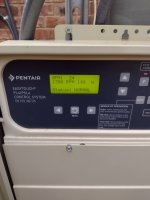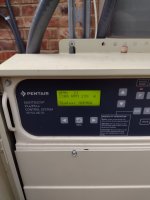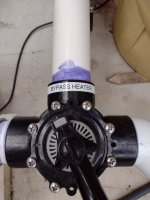I found when considering a bypass, that there are primarily 2 types of responses I would get when inquiring about the pros and cons.
1. I don't see why you would want to install a heater bypass, but I cant see how it could hurt anything. (My builder was in this group as well)
2. It's a good thing to have during startup, slamming or any high chemical concentrations or if you have heater equipment failure and need to take it offline for repairs.
The split was about 50/50. The reasons I was considering installing the bypass was for the startup chemicals and potential future shock treatments. But mainly to take it offline 8 or 9 months a year to potentially help it last longer. Since there weren't any real CONS even from group A, I went ahead and installed one. To my suprise, there is a HUGE benefit that, IMO is a strong case that EVERYONE with a heater should have a bypass option installed.
It's all about power/energy savings. In my case, the operating power required, at 30gpm, is cut in half when I'm using the bypass!!! Pushing water through the heater at 30GPM takes 338 Watts, whereas bypassing the Heater it takes only 157 Watts for the same 30GPM. The energy savings of course would vary based on Flow rate, other plumbing considerations, heck even the cleanliness of the filters might effect it. However at the moment in time that I noticed this, it was a 50% difference. I felt it was an important enough positive for the bypass that I had to share.
I'd be curious if anyone else has looked into this on their pool? I'd love to hear what your findings are with and without the bypass.
Regular plumbing water going THROUGH the heater.
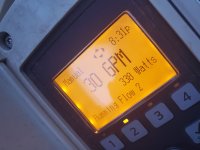
Using the Bypass, no water passing through the heater.
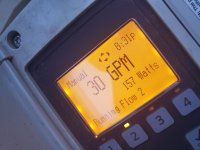
1. I don't see why you would want to install a heater bypass, but I cant see how it could hurt anything. (My builder was in this group as well)
2. It's a good thing to have during startup, slamming or any high chemical concentrations or if you have heater equipment failure and need to take it offline for repairs.
The split was about 50/50. The reasons I was considering installing the bypass was for the startup chemicals and potential future shock treatments. But mainly to take it offline 8 or 9 months a year to potentially help it last longer. Since there weren't any real CONS even from group A, I went ahead and installed one. To my suprise, there is a HUGE benefit that, IMO is a strong case that EVERYONE with a heater should have a bypass option installed.
It's all about power/energy savings. In my case, the operating power required, at 30gpm, is cut in half when I'm using the bypass!!! Pushing water through the heater at 30GPM takes 338 Watts, whereas bypassing the Heater it takes only 157 Watts for the same 30GPM. The energy savings of course would vary based on Flow rate, other plumbing considerations, heck even the cleanliness of the filters might effect it. However at the moment in time that I noticed this, it was a 50% difference. I felt it was an important enough positive for the bypass that I had to share.
I'd be curious if anyone else has looked into this on their pool? I'd love to hear what your findings are with and without the bypass.
Regular plumbing water going THROUGH the heater.

Using the Bypass, no water passing through the heater.




